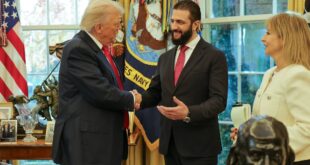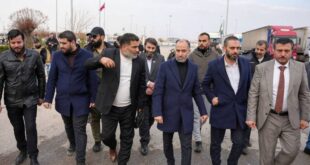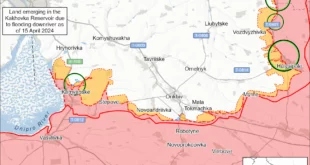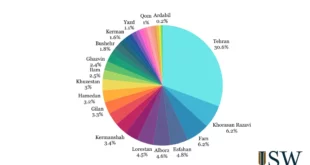A visit by the commander of Iran’s elite Quds Force to Baghdad has led to a pause in attacks on U.S. troops by Iran-aligned groups in Iraq, multiple Iranian and Iraqi sources told Reuters.
Here’s a look at Iraq’s most influential Shi’ite parties and armed groups, who remain divided over how to address the presence of U.S. forces in the country:
THE COORDINATION FRAMEWORK
The ruling Shi’ite coalition of Iraqi parties and armed groups and main backer of Iraqi Prime Minister Mohammed Shia al-Sudani, who came to power in October 2022.
The members of this coalition compete for power and resources and often do not see eye-to-eye. They are united in opposition to powerful rival Shi’ite cleric Moqtada al-Sadr.
The coalition has opposed attacks on U.S. forces since the outbreak of the Gaza war, instead calling for their negotiated exit. Leaders include:
- Nouri Al-Maliki
A former two-term prime minister and leader of the Dawa party which dominated successive Iraqi governments after 2003. Maliki has close ties with Iran, which supported Dawa’s opposition to Saddam during the 1980s Iran-Iraq war.
He has links with armed groups, deep state power and is Sadr’s fiercest opponent. - Hadi Al-Amiri
Leader of the Badr Organisation, which started as a Shi’ite paramilitary group supported by Iran in the 1980s.
Badr makes up a big part of the Popular Mobilisation Forces (PMF), the heavily armed Iraqi state security agency that contains many Iran-backed factions who often operate outside the chain of command. - Qais Al-Khazali
The former insurgent fought as part of Sadr’s Mehdi Army against U.S. troops but split in 2006 to form his own armed group, Asaib Ahl al-Haq, which now holds a number of seats in parliament.
Khazali’s group is heavily armed and actively involved in social media groups which distribute the messaging of Iran-backed paramilitary factions.
-Haider Al-Abadi and Ammar Al-Hakim
Two moderate Shi’ite politicians who do not openly support any particular armed factions.
Hakim is a cleric whose uncle Mohammed Baqir al-Hakim led the Islamic Supreme Council of Iraq, a party founded in Iran that ran Iraq’s interior ministry after the U.S. invasion.
Abadi, a former prime minister, is a senior leader in the Dawa party who led Iraq to its defeat of ISIS in 2017.
THE ISLAMIC RESISTANCE IN IRAQ
An umbrella group of hardline Shi’ite Muslim armed groups close to Iran, the Islamic Resistance in Iraq has claimed more than 150 attacks on bases housing U.S. forces in Syria and Iraq since October.
Armed factions in this group are members of the PMF and have good relations with parties in the Coordination Framework. Its main factions are designated terrorist organisations by the U.S.
The group includes:
-Kataib Hezbollah
One of the armed factions closest to Iran. It fielded a party for the first time in 2021 elections and won several seats in parliament.
Accused of being behind attacks on U.S. military and diplomatic targets in Iraq, it does not openly confirm or deny involvement.
It was founded by Abu Mahdi al-Muhandis in 2005. In 2020, Muhandis was killed by a U.S. air strike in Baghdad along with Iranian Major-General Qassem Soleimani.
Kataib Hezbollah has no publicly announced leadership structure, but its senior member Abdul Aziz al-Mohammedawi is the military chief of the PMF.
Washington said it was behind a January attack in Jordan that killed three U.S. troops.
-Haraket Hezbollah al-Nujaba
Formed as an offshoot of other armed groups, Nujaba has a strong presence in Syria, where it helped prop up the Assad regime during the Syrian civil war. It later fought Islamic State in Iraq and Syria.
Led by Akram al-Kaabi, it has announced a Golan brigade aimed at pushing Israeli forces from the Israel-occupied Golan Heights.
-Kataib Sayyed Al Shuhada
Smaller than the other two groups, this armed faction also fought in Syria to support Assad and later against Islamic State.
It has at least one seat in parliament and is led by Abu Alaa al-Walaei, a previous member of Kataib Hezbollah.
MOQTADA AL-SADR AND THE SADRIST MOVEMENT
Sadr, a mainstay in the Iraqi Shi’ite scene for two decades, announced his exit from politics in 2021 after failing to form a government. Many Iraqi officials and analysts expect him to eventually make a comeback.
He led an insurgency against the U.S. occupation of Iraq after the toppling of Sunni Muslim dictator Saddam Hussein.
Sadr inherited a mass following of mostly impoverished Shi’ites from his cleric father who opposed Saddam and was killed for it.
Sadr has styled himself as a nationalist who opposes all foreign interference, especially from Iran, and accuses Shi’ite rivals of corruption.
He has a thousands-strong militia, Saraya al-Salam, and wields influence within the Iraqi state.
Sadr’s large supporter base enables him to act as a spoiler in Iraq’s politics.
 Eurasia Press & News
Eurasia Press & News




